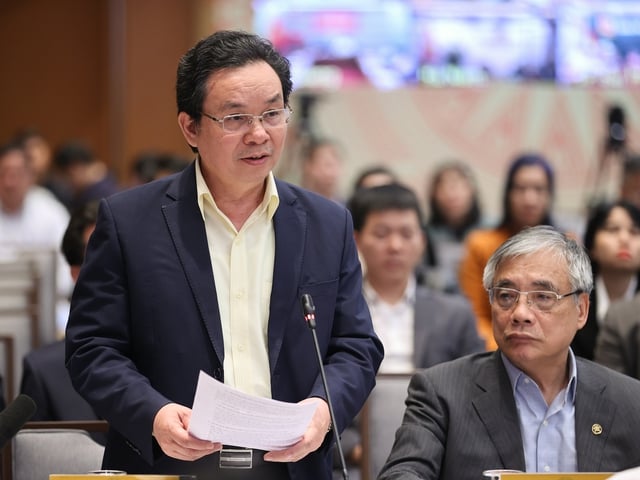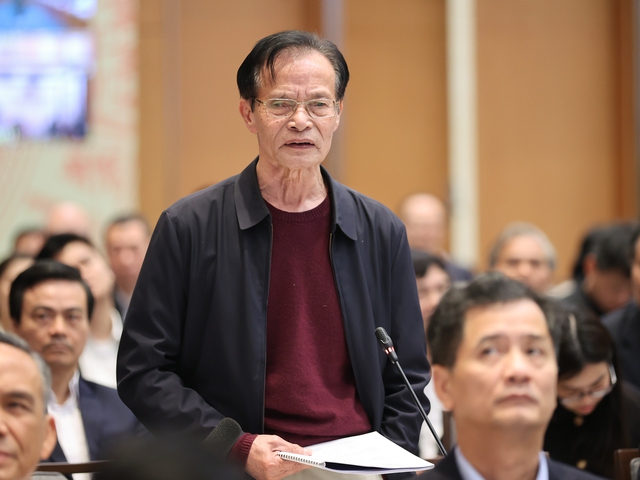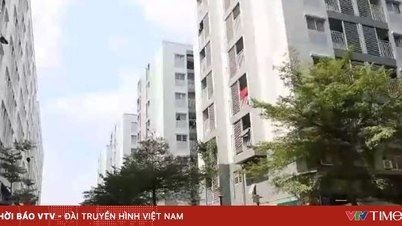Speaking at a conference on resolving difficulties in social housing, Dr. Hoang Van Cuong, Vice Rector of the National Economics University, said that this is a very opportune time to promote the development of social housing; however, the implementation results are still limited.

Dr. Hoang Van Cuong, Vice Rector of the National Economics University
"I suggest we define the goals of social housing development more accurately. Are we addressing the housing needs of low-income earners, or are we addressing the need for home ownership among low-income earners?", Dr. Cuong raised the question.
He argued that, in recent times, the social housing development program has focused more on addressing the housing needs of low-income earners than on supporting the need for home ownership among low-income individuals.
For low-income earners, simply making ends meet is difficult, so how can they possibly save enough money to pay interest and principal on loans?
"I heard a representative of a social housing development company say that after a period of inspection, up to 80% of the buyers were no longer living there and had resold the properties," Mr. Cuong stated.
Therefore, according to him, more attention should be paid to social housing development programs for rent with more favorable conditions compared to current programs.
Currently, the locations for social housing development are quite far from the provincial and city centers. Transportation is lacking, and travel time is long, so people are reluctant to move far.
"The social housing program allocates only 2% for rent, but those are far away, so people won't rent them. People are willing to rent houses at higher prices, even if they are smaller, but closer to their workplaces, their children's schools, and other superior amenities in the city center," Mr. Cuong stated.
Therefore, according to this expert, it is necessary to plan locations near the city center but with low commercial potential to build rental housing. Only for rent, not for sale, will we be able to meet the housing needs of low-income individuals.
This type of rental housing should utilize highly preferential loan capital. For example, long-term loans from the Social Policy Bank with low interest rates. The reason is that if businesses invest capital solely for rental purposes, the rental income will not cover operating costs, let alone recoup their investment. "This program should allocate 50% for rentals and 50% for purchases," Mr. Cuong stated.
Furthermore, regarding capital support for social housing development, loan conditions for investors need to be simplified as much as possible. Lowering interest rates by 1.5-2% is not very meaningful; instead, a specific interest rate commitment is needed, for example, a commitment of 7-8%, to allow businesses to make informed decisions.
This expert also argued that the 40 trillion VND interest rate subsidy package under Resolution 43 was largely undisbursed. Therefore, the 40 trillion VND package should be redirected to a low-income housing support program – a program that targets the right projects and beneficiaries, avoiding the risk of improper lending.
In addition, the loan term for this project needs to be extended, ensuring at least one cycle is sufficient for the business to invest and recover its capital.
Prioritize inner-city land for housing for the poor to rent.
According to Dr. Le Xuan Nghia, a member of the National Advisory Council on Financial and Monetary Policy, many unsuccessful policies stem from forcing banks to lend at low interest rates, bearing all policy risks.
"Banks and businesses are separate entities; according to market economics, they shouldn't be left at a disadvantage and must be treated according to market mechanisms. The same applies to social housing development policies," Mr. Nghia stated.

Dr. Le Xuan Nghia, Member of the National Advisory Council on Financial and Monetary Policy
Agreeing with the option of building rental housing, Dr. Le Xuan Nghia suggested that the government should prioritize inner-city land for housing for the poor because the poor lack transportation options other than public transport. Large cities around the world plan housing in a way that places the poor near public transport systems and hospitals.
The second model is a housing development model similar to Singapore, where those who buy a house pay an interest rate of 2.5% on a bank loan with a term of up to 30 years, and the government compensates for the difference compared to the market interest rate. Thus, the banks are not affected because they receive government support.
The minimum mortgage term in the US and Singapore is 30 years, and even in German-speaking areas of Switzerland it's 88 years.
Another problem is administrative procedures linked to petty corruption. "We surveyed several provinces, and the procedures are incredibly complicated. In some provinces, compensation for land clearance only clears a few dozen hectares or even seventy hectares a year. Meanwhile, some provinces have reformed their methods, increasing the area for compensation and clearance from 110 hectares to 1,000 hectares – something nobody believed possible, but they eventually achieved it. Procedures are one of the biggest problems currently requiring reform," Mr. Nghia stated.
Citing numerous examples of businesses specializing in social housing, such as those from South Korea, Singapore, and the Netherlands, that applied to build social housing in Hanoi but encountered obstacles in obtaining approval for planning schemes at scales from 1/2000 to 1/500, he argued that the approval process must be flexible.
Source link


![[Photo] Prime Minister Pham Minh Chinh receives the Governor of Tochigi Province (Japan)](/_next/image?url=https%3A%2F%2Fvphoto.vietnam.vn%2Fthumb%2F1200x675%2Fvietnam%2Fresource%2FIMAGE%2F2025%2F12%2F16%2F1765892133176_dsc-8082-6425-jpg.webp&w=3840&q=75)
![[Image] Leaked images ahead of the 2025 Community Action Awards gala.](/_next/image?url=https%3A%2F%2Fvphoto.vietnam.vn%2Fthumb%2F1200x675%2Fvietnam%2Fresource%2FIMAGE%2F2025%2F12%2F16%2F1765882828720_ndo_br_thiet-ke-chua-co-ten-45-png.webp&w=3840&q=75)
![[Photo] Prime Minister Pham Minh Chinh receives Lao Minister of Education and Sports Thongsalith Mangnormek](/_next/image?url=https%3A%2F%2Fvphoto.vietnam.vn%2Fthumb%2F1200x675%2Fvietnam%2Fresource%2FIMAGE%2F2025%2F12%2F16%2F1765876834721_dsc-7519-jpg.webp&w=3840&q=75)

































































![[Photo] Prime Minister Pham Minh Chinh attends the Vietnam Economic Forum 2025](https://vphoto.vietnam.vn/thumb/402x226/vietnam/resource/IMAGE/2025/12/16/1765893035503_ndo_br_dsc-8043-jpg.webp)




































Comment (0)